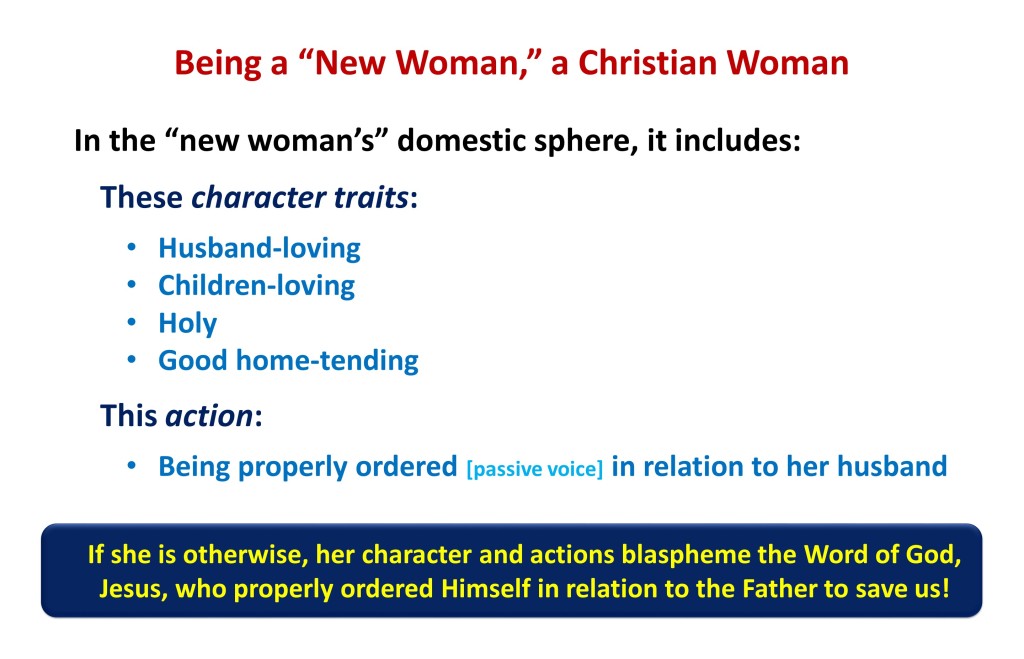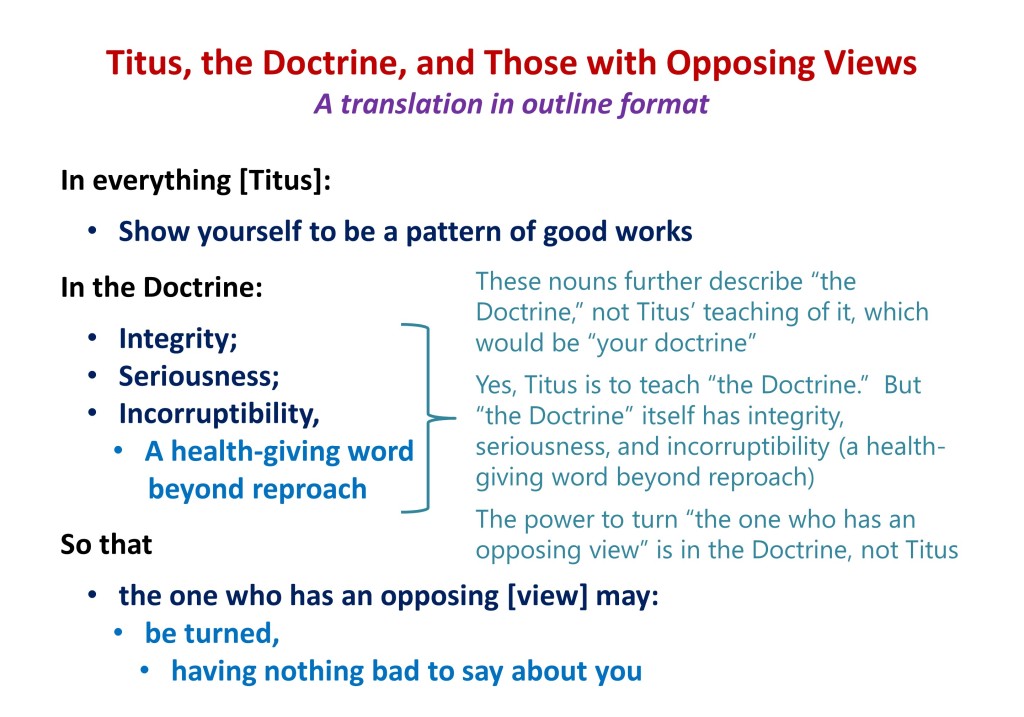 Paul had just commanded Pastor Titus to “speak that which is proper, according to the health-giving Doctrine.” Now Paul gets specific: he tells what Titus is to speak and to whom.
Paul had just commanded Pastor Titus to “speak that which is proper, according to the health-giving Doctrine.” Now Paul gets specific: he tells what Titus is to speak and to whom.
Speak this to the Older Men
Read Titus 2:2
The “older men” to whom Paul refers are not the same as the “elders,” pastors whom Titus was to appoint for the various congregations on Crete.
“sober-minded”: Greek, naphalios, temperate in the use of alcohol, but also clear-headed. The Pauline epistles say that drunkenness is incompatible with a Christian way of life (Galatians 5:21; 1 Thessalonians 5:6-8; 1 Corinthians 5:11, 6:10; Romans 13:13; Ephesians 5:18).
“dignified”: Greek, semnos, “venerable, serious, well-respected, prudent” or even “reverent.” He behaves in a way that does not involve odd or scandalous behavior. His actions and manner make him “worthy of respect,” or “serious and worthy”; it even many include “gravitas.”
“self-controlled”: Greek, sophron, . Philo tells us that this term refers to the health of the soul, the virtue that makes someone’s thinking sane (Virtues 14). Our English words “sanity” and “being sensible” capture some of the nuance (see also Acts 26:25; 2 Corinthians 5:13).
Although Paul applies these virtues to older Christian men, they were also virtues expected from older, respectable men in the culture of that time. Paul now moves to virtues that apply specifically to the Christian. We know this because of what comes next.
“faith”: Greek, ho pistis, “the Faith.” Faith, “fides,” to the Roman would have meant unwavering fidelity or loyalty to one’s promise or spoken word. In other words, “faith” would have focused on the person, what he did and how he acted. Here, “the Faith” focuses on that which comes to someone outside of himself.
- Of course personal faith is also meant. For this to be so, what is the older man to be in relation to “the Faith”?
- Discuss: If “the Faith” is something that comes to someone from outside of himself, how then does someone become “healthy” (hugiano) in “the Faith”?
“sound… in love”: “Greek, “healthy… in the love.” This is not just any love, but specifically Christian love. This is agape, a self-giving love.
“sound… in steadfastness”: “healthy… in the steadfastness.” This is not endurance in general, but Christian endurance.
These attributes are the Christian triad of faith, love, and a virtue based on hope: perseverance or patient endurance. For these virtues to exist in the Christian depend on being spiritually “healthy.” (See also 1 Timothy 6:11, 1 Thessalonians 1:3, and 1 Corinthians 13:13).
Speak this to the Older Women
Read Titus 2:3-4a (through “train the young women)
“reverent in behavior”: Greek, heiroprepas. This is the only place this word appears in the Bible. In Greek, it refers to conduct befitting a priest or priestess, someone who serves in a temple. Paul is tapping into the idea that Christians are part of God’s Royal Priesthood. Since “older women” are “likewise” part of this priesthood, they live in such a way.
“not slanderers”: Greek, diabolos, “devils.” This is not to be speaking lies, or even empty words, about another.
“slaves to much wine”: Literally, “not being enslaved to much wine.” This is not getting drunk or being addicted to wine.
“the younger women”: Literally, “the new women,” new Christian women, who may be young.
What the Older Women are to Teach to the New Women
Read Titus 2:4b-5
- When we look at what the older women are to teach, in what area does their instruction apply in the younger women’s lives?
- If a woman is “new” to the Christian Faith, why would such instruction help her?
“train”: Greek, sophronizo, to encourage, advise, urge—the end result being something sensible.
“love their husbands”: Greek, philandros, an adjective, “husband-loving.” This is not what to do but to encourage the “new woman” to develop this character trait.
“love their… children”: Greek, philoteknos, an adjective, “child-loving.” This is not what to do but to encourage the “new woman” to develop this character trait.
“self-controlled”: Greek, sophron, an adjective, “sensible.”
“holy”: Greek, hagnos, an adjective, “holy, pure, set-apart.”
“working at home”: oikouros, an adjective; literally, “home-tending.” This is not what the “new woman” is to do but a character trait that she is to develop, one that focuses on the tasks that she may have in the domestic sphere.
“kind”: Greek, agathos, an adjective, “good.” Grammatically, this adjective modifies the preceding adjective (in Greek, adjectives follow what they modify). The “new woman” is to develop the character trait of “good home-tending.” This is an outgrowth of understanding one’s vocation and serving in such a way.
“submissive”: Greek, hupatosso, a verb, a passive participle, “being properly ordered” or “being submitted.” Up to now, Paul has only mentioned character traits, but here we find a verb. This is not the woman forcing herself to submit by her choice or will (if so, this verb would be in an active imperative verb). This is a change that takes place in the “new woman” because of the older woman’s teaching and encouragement, which bring about a change in the heart and will. This change brings her into “being properly ordered” in relation to her husband.
“to their own husbands”: Paul say nothing here about women submitting themselves to men in general. Further, in the husband-wife relationships, neither it is not for the husband to demand “submission” but for the woman to give it (See Ephesians 5:22, Colossians 3:18).
“word of God”: This refers to Jesus, the Word of God. The genitive form, “of God,” in the Greek emphasizes divinity. The “word of God” in the sense of teaching or scripture is secondary—they gets their “divinity” from the “Word of God,” Jesus.
Speak this to “the New Men”
Read Titus 2:6
“urge”: parakaleo, call to one’s side, often to comfort.
“the younger men”: Literally, “the new men,” new Christian men, who may be young.
“self-controlled”: Greek, sophroneo, an infinitive verb, “to be sensible.”
A Short Aside on What Titus is to be Doing
Read Titus 2:7-8
“in your teaching”: Literally, “in the Teaching” or “in the Doctrine.” Although Titus is to be the teacher, but he is teaching the Teaching, the Doctrine, not whatever he wants to teach.
“dignity”: Greek, semnotas, seriousness.
“be put to shame”: Greek, entrepo, a passive verb. It can mean “to shame” (as a verb) but also “to turn about.” Being a passive, it would mean, “be turned about.”
Speak this to Slaves
“submissive”: Greek, hupatosso, a verb, a passive participle, “being properly ordered” or “being submitted.” As with the “new woman” this is not a slave forcing himself to submit by his choice or will (if so, this would be an active imperative verb). This is a change takes place in a slave because of what Titus is to speak: The Doctrine. This brings about a change of the heart and will, which then brings slaves into “being properly ordered” in relation to his master. It is not the role of a Christian master to force as slave “to submit.”
- How does someone “adorn the Doctrine of God our Savior”?
- What then shapes how the Christian adorns the Doctrine of God our Savior?
Excursus: Enthymemes
Since Paul is writing to a pastor, he sometimes doesn’t state all his premises. He’s expecting Titus to fill in the blanks. Here are a couple of examples.
- Titus must show himself to be a pattern of good works.
- [Enthymeme: Those who have opposing views may look for reasons to belittle our pastors.]
- So they will find nothing to criticize.
- Slaves are to be properly ordered in relation to their masters and show faithfulness to them.
- [Enthymeme: That testifies to their faithfulness in Christ.]
- By doing so, their acts adorn the Doctrine of God, Jesus, our Savior.




